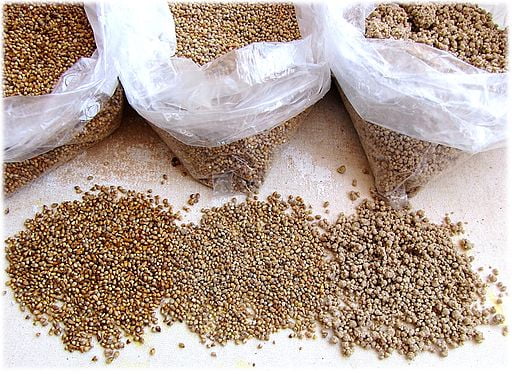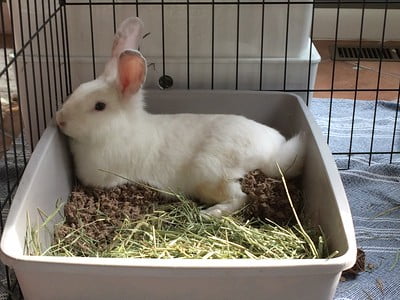Last Updated on February 27, 2023 by Marjon Ramos
Rabbits that are not drinking water can die from impactions, heatstroke, dehydration, and urinary stones. Your rabbit should always have clean, drinkable water available to them.
Rabbits should never be left alone without access to clean, drinkable water for more than 24 hours. Without access to clean, drinkable water, your rabbit could suffer from dehydration, especially if it’s hot and humid.
Now that I’ve given you the gist of the article, read on as I explain in more detail why your rabbits can die without water:
Table of Contents
How can rabbits die without water?
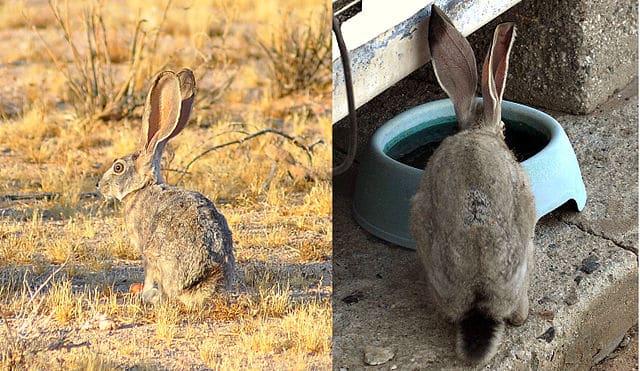
Dehydration
Rabbits would most likely die from dehydration first if they were not given water to drink for 24 hours.
Rabbits need to drink 50-100 mL/kg of water every 24 hours. Without it, they can easily die from dehydration, especially in the summer months.
It can also depend on your rabbit’s diet. Rabbits that are eating a lot of vegetables may survive a bit longer even without water because most plants are high in water content.
Some rabbits can even go a whole day without drinking water if they’re fed large amounts of vegetables, which is bad for them.
While rabbits that are on a high-protein diet, fibrous, salty, or dry foods would likely die faster than usual. This type of food absorbs water in the intestinal tract.
Heatstroke
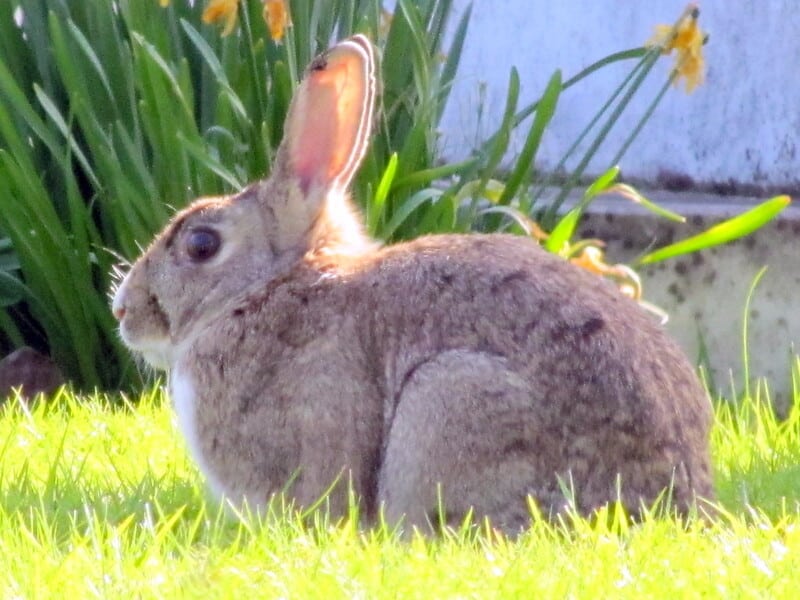
Rabbits that don’t have access to clean, drinkable water in the summer months would likely die from heatstroke. Rabbits are more sensitive to heat than cold.
Rabbits can’t sweat, except for a few sweat glands on their lips. They also cannot pant like dogs and other animals to signal to their owners that it’s too hot. Rabbits primarily breathe through their noses.
Impaction
Without water, your rabbit’s gut would not function properly because of a lack of moisture. This, in turn, could lead to intestinal blockage or impaction.
Impactions in rabbits can also be life-threatening if not treated.
Urinary stones
Lack of water would also make it hard for your rabbit to flush out the excess calcium in their diet. This in turn could lead to the development of urinary stones.
Urinary stones can lead to kidney failure and death if not treated immediately.
How to tell if your rabbit is dehydrated?
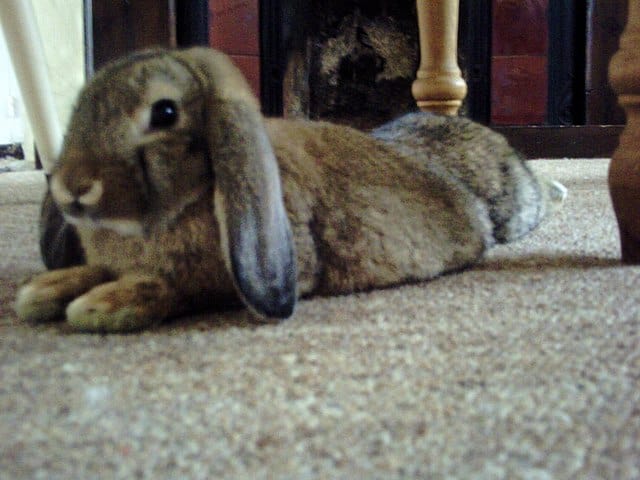
To tell if your rabbit is dehydrated, you have to look for its symptoms:
You can tell that your rabbit’s urine is dark by its smell. Dark urine that’s caused by dehydration has a stronger scent of ammonia.
As for wrinkled skin, you can test for dehydration by gently pulling a little bit of skin on the back of your rabbit’s neck. If the skin stays in place for a few seconds, it’s a good indicator that your rabbit might be suffering from dehydration.
As for fever, the only way to be certain that your rabbit has a fever is by taking a rectal temperature. I would advise that you let your veterinarian do this one, though, because rabbits are very squeamish.
Finally, lethargy and lack of appetite are the end-stages of dehydration. When this symptom shows up, it’s time to bring your rabbit to a veterinarian.
What causes dehydration in rabbits?
The most common causes of dehydration in rabbits are the lack of access to clean, drinkable water and diarrhea. Rabbits normally drink 50-100 mL/kg of water every 24 hours.
Here’s a table that shows how much water a rabbit would drink depending on its breed:
| Rabbit’s weight based on breed | Water requirement per day |
|---|---|
| Small breed (1.1–3.5 pounds) | 25-158mL |
| Medium breed (6 to 10 pounds) | 136-454mL |
| Large breed ( 9 and 12 pounds) | 204-544mL |
The amount of water that rabbits need to drink per day is highly dependent on a lot of factors. As an example, if it’s hot where you live, your rabbits might need to drink more water than usual.
Rabbits that are eating a lot of vegetables might not drink water at all because most vegetables that rabbits eat already have a lot of water in them.
The most common cause of rabbits that die due to dehydration is when a rabbit owner forgets to change or fill their rabbit’s bowl when they’re not coming home for a few days.
Also, rabbits that are caged outside in direct sunlight are more likely to suffer from dehydration. Never cage your rabbit outside without any protection from the sun.
Finally, rabbits that are suffering from diarrhea are more likely to suffer from dehydration. Rabbits that have diarrhea are losing large amounts of water every time they poop.
Rabbits that have diarrhea are also most likely exhibiting lethargy. This can make it hard for them to drink the water they need. That’s why diarrhea is often life-threatening to rabbits if it’s not treated immediately.
How long can a rabbit survive before dying of dehydration?
The amount of time a rabbit has before it dies of dehydration depends on a couple of factors, but it can be as little as 24 hours.
Rabbits that are eating a lot of vegetables might survive a bit longer even without access to water because most of these plants contain a lot of water.
Some rabbits can even go a whole day without drinking water if they are fed high-water-content vegetables.
Rabbits that are dehydrated and experiencing heatstroke can die in under 24 hours.
How to prevent your rabbit from dying of dehydration?
Your rabbits should have access to clean, drinkable water 24/7 to prevent them from dying of dehydration.
But if your rabbit is experiencing dehydration due to diarrhea, it’s best that you take them to a veterinarian. Most rabbits that are suffering from diarrhea will also experience lethargy.
Dehydration caused by diarrhea can make a rabbit so lethargic that it can’t drink on its own. Your vet might administer IV fluids to help your rabbit hydrate.
When should you bring your rabbit to a veterinarian to prevent it from dying of dehydration?
You should always bring your rabbit to a veterinarian the moment you notice any behavioral changes or changes in their poop or urine.
If you wait too late, your rabbit might not be able to survive even if you take them to a veterinarian. Remember, rabbits can die within 24 hours of dehydration.
Conclusion
Rabbits would most likely die of dehydration first if they didn’t have access to drinkable water. This can happen within 24 hours, especially if it’s hot and humid where you live.
Rabbits can also die from urinary stones and impactions if they don’t have access to water. Without water, rabbits cannot flush out the excess calcium in their diet, which in turn can lead to kidney failure and death.
Finally, a rabbit’s gut needs water to function properly, without moisture, impactions or blockages could happen. This can be life-threatening if not treated.
Cite this article:
Related Articles
- How Often Should You Change Your Rabbit’s Water?
- How To Tell If A Rabbit Is Dehydrated?
- What To Do If Your Rabbit Is Not Pooping?
- Why Is My Rabbit Drinking A Lot Of Water?
- Why Is My Rabbit Shaking And Laying Down?
- How Often Should You Change Your Rabbit’s Water?
- Rabbit Has Poop Stuck To His Bum. What Is It And What To Do About It?
Sources
- Bladder Stones and Bladder Sludge in Rabbits
- Health and welfare information about your rabbit from Vetlexicon Lapis.
Image credit – FASTILY, CC BY-SA 3.0 https://creativecommons.org/licenses/by-sa/3.0, via Wikimedia Commons, Jessie Eastland – uploaded by Pocketthis at en.wikipedia, CC BY-SA 3.0 https://creativecommons.org/licenses/by-sa/3.0, via Wikimedia Commons, UsanaAngelou, CC BY-SA 4.0 https://creativecommons.org/licenses/by-sa/4.0, via Wikimedia Commons, “rabbit” (CC BY 2.0) by Mostly Dans

